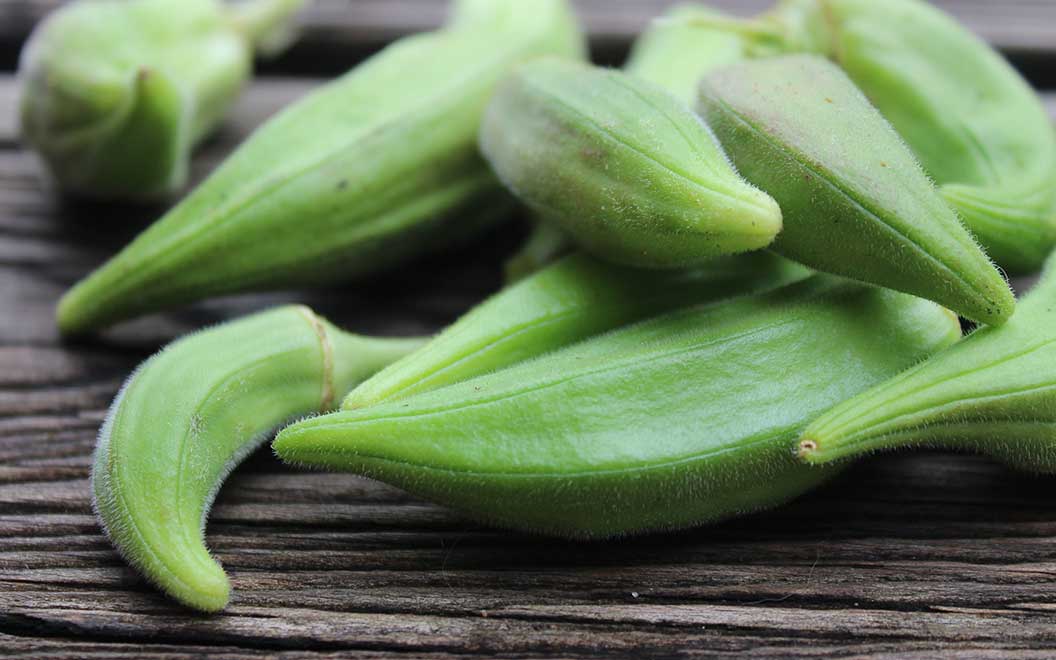BACKGROUND
Okra originated from Tropical Africa and was taken to other parts of the world by the Portuguese. It belongs to the Malvaceae family. The Americans call the crop okra and called ladies finger by the British.
In Ghana, okra is one of the most widely grown vegetables. The crop grows well throughout the year in West Africa, producing good yields if the soil is fertile and there is sufficient moisture in the soil. It is a very important crop in the diet of many Ghanaians and hence its importance in the economy of Ghana.
Nutritionally both the leaf and fruits are eaten as vegetables. The fresh fruits contain some amount of protein, carbohydrates, vitamins A and C with traces of B vitamins. It is also a good source of calcium, phosphorus, and iron. Roasted and ground seeds are used in cooking and for edible oil extraction. In Ghana, almost every agricultural commodity has become a potential export crop because of the effort to narrow the gap between the traditional export crops like cocoa and coffee, and food crops.
NATURE
Okra (Abelmoschus esculentus, Hibiscus esculentus), is a storehouse of rich micronutrients for the human body, according to food science. Okro or okra is an annual plant that is biologically classified as a fruit, but it is generally utilized as a vegetable in cooking. The okra plant can grow up to 1.5 metres tall. The young okra fruits are harvested when immature and are eaten as vegetables. In Ghana and West Africa, okra is cultivated for its fruits or young edible seedpods. The young okra fruit contains a characteristic thick mucilaginous substance that gives the cooked vegetable its slimy feel and taste.
Okra is a very good source of dietary fibre, magnesium, potassium, vitamin K, vitamin C, folate, and B6. Studies have indicated that okra is rich in bioactive components, such as flavonoids. Because of its rich nutrients, okra is known to be beneficial for health in several ways.
HEALTH BENEFITS
- A Rich Source of Antioxidants
Antioxidants are chemical substances that may protect the cell by neutralizing the effects of free radicals (which may play a role in heart disease, cancer, and other diseases) on the cells.
- May Lower Blood Sugar
The insoluble fibre contained in okra is believed to help stabilize blood glucose by slowing the rate at which sugar is absorbed from the intestinal tract.
- May Lower Risk of Heart Disease
The gel-like mucilage content of okra can bind to cholesterol during digestion, causing it to be excreted with stools rather than absorbed into your body.
- May Help Prevent Cancer
Okra has a protein called lectin which is linked with fighting breast cancer. It is also said that okra suppresses cancer cell growth and helps in preventing cancer. Folate is also an essential nutrient that helps in preventing the risk of various cancers.
- Beneficial to Pregnant Women
It may be beneficial to pregnant women because it’s a good source of folate: 1 cup (100 grams) of okra can provide up to 15% of a woman’s daily needs for this nutrient. Folate (vitamin B9) is an important nutrient for pregnant women because it helps lower the risk of a neural tube defect, which affects the brain and spine of a developing fetus. It also ensures easy delivery
NOTABLE FACT
Although Ghana has a high potential of producing both fresh and seed okra, most farmers are currently in the production of fresh okra. Although both fresh and seed okra production are profitable, seed okra production is more profitable than fresh okra in the rainy season. Dry season fresh okra fruits production reaps higher returns than rainy season fresh okra fruits production. Major constraints in okra production are attributed to increasing pests and diseases, the high cost of the agrochemical, and poor market price.


Comments are closed.